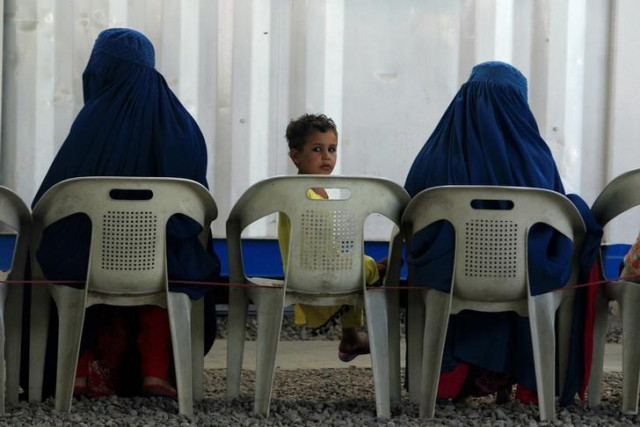Afghan refugees in Pakistan hope for a peaceful Afghanistan
Peace deal between Taliban and the United States celebrated as a new beginning

Afghan refugees are seen at UNHCR’s Voluntary Repatriation Centre in Peshawar. PHOTO: REUTERS
“It is the beginning of the end of the longest nightmare for many of us who have seen Afghanistan and its people suffer,” said Allah Dost, an Afghan refugee, who has spent much of his life in Pakistan.
Now 50, Dost’s homeland has convulsed since the Soviet invasion in 1979, forcing millions to flee and resettle on the other side of the border. The unrest, and power struggle that followed the Soviet exit, continued until the US invasion in 2001. During both episodes of foreign invasion, Pakistan became an easy and perhaps the only choice for millions of displaced refugees.
So many of the displaced Afghans fled war, as children, stuffed onto the backs of donkeys and dragged across the most rugged stretch of land to the safety of northwestern Pakistan. At one point after the Soviet invasion, more than 5 million Afghans were living in Pakistan. In 2001, shortly after the Americans used brute force in the war-torn country, another torrent of refugees poured out of Afghanistan.
“Peace will finally prevail in my homeland, and it starts with the signing of the agreement between the Taliban and the occupying force,” said Dost, with a smile on his face. Like many of his age, Dost was a young boy when he arrived in Pakistan with his family.
After nearly four decades of conflict, more than 1.5 million Afghans still live as refugees, feeling abandoned by their country increasingly unwelcome in their host country. The conflicts, Dost said, only targeted ordinary Afghan nationals. “Our nation was used as a battle-ground from by the Soviet Union and even by the US after 9/11,” he said.
Watching the situation unfold on his television screen near the Torkham border, Atta Ullah Khan Shinwari, another refugee, hailed the event as the beginning of a new period of peace not just for Afghanistan but also for Pakistan.
“This peace agreement will allow both Pakistan and Afghanistan to live next to each other like normal neighbours and carry out trade,” said Shinwari, who was visibly overwhelmed by the news.
Concurring with Shinwari and Dost, 40-year-old Safi Ullah, a refugee from Nangrahar, said the new peace deal was good enough reason for celebration. “The agreement offers a glimmer of hope for all Afghan refugees living in Peshawar,” he said.
With cautious optimism, Professor Dr. Hussain Shaheed Seharwardi, a senior faculty member at Peshawar University, said: “The agreement gives hope, but similar agreements in 1992 failed because the Taliban were unable to keep their end of the bargain.”
Seharwardi said the US used brute force in Afghanistan against an army of militants for two decades only to sign a deal with them. The expert was not sure about the future of the deal or what it might have to offer in the long run.
Ending two decades of war, the US and the Taliban signed a landmark peace agreement last week that could ultimately result in American troops leaving Afghanistan within 14 months. The deal also paves the way for talks between Afghans to end one of the longest-running conflicts in the world.
Published in The Express Tribune, March 4th, 2020.













COMMENTS
Comments are moderated and generally will be posted if they are on-topic and not abusive.
For more information, please see our Comments FAQ